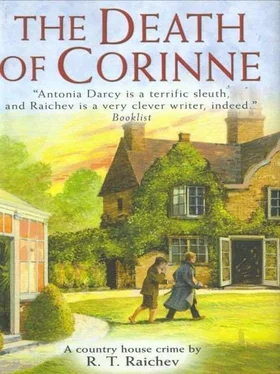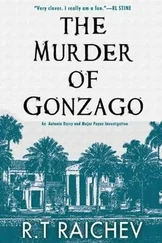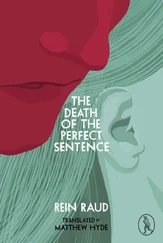R Raichev - The Death of Corinne
Здесь есть возможность читать онлайн «R Raichev - The Death of Corinne» весь текст электронной книги совершенно бесплатно (целиком полную версию без сокращений). В некоторых случаях можно слушать аудио, скачать через торрент в формате fb2 и присутствует краткое содержание. Жанр: Классический детектив, на английском языке. Описание произведения, (предисловие) а так же отзывы посетителей доступны на портале библиотеки ЛибКат.
- Название:The Death of Corinne
- Автор:
- Жанр:
- Год:неизвестен
- ISBN:нет данных
- Рейтинг книги:3 / 5. Голосов: 1
-
Избранное:Добавить в избранное
- Отзывы:
-
Ваша оценка:
- 60
- 1
- 2
- 3
- 4
- 5
The Death of Corinne: краткое содержание, описание и аннотация
Предлагаем к чтению аннотацию, описание, краткое содержание или предисловие (зависит от того, что написал сам автор книги «The Death of Corinne»). Если вы не нашли необходимую информацию о книге — напишите в комментариях, мы постараемся отыскать её.
The Death of Corinne — читать онлайн бесплатно полную книгу (весь текст) целиком
Ниже представлен текст книги, разбитый по страницам. Система сохранения места последней прочитанной страницы, позволяет с удобством читать онлайн бесплатно книгу «The Death of Corinne», без необходимости каждый раз заново искать на чём Вы остановились. Поставьте закладку, и сможете в любой момент перейти на страницу, на которой закончили чтение.
Интервал:
Закладка:
‘Well, he has. He drove all the way down from London. Must have started at some unearthly hour. He’s in the dining room, drinking coffee. He looks like a funeral director, quite unlike himself. He seems to know about it already -’ Lady Grylls broke off. ‘Provost says Maginot has been shot – is that correct?’
‘Yes.’ Payne then told her to prepare for another shock. ‘Maitre Maginot’s body isn’t the only one in the greenhouse, darling. Eleanor Merchant is there too – shot as well… It looks as though she killed Maginot and then committed suicide.’
‘You don’t mean that, do you, Hughie?’
He said he did. He swore he wasn’t making it up.
‘That’s a pretty kettle of fish,’ Lady Grylls said after a pause. ‘So that’s what Peverel meant when he said there were two of them. I thought I’d misheard. Goodness. That woman came all this way from America to shoot herself in my greenhouse. Incidentally, do you remember that awful weepy, Love Story? When was it made, can you tell me?’
Major Payne blinked. ‘Sorry, darling? What love story?’
‘Love Story. The film. When was it made?’
‘When was it -? Early seventies… 1970, at a guess. ’
‘1970. I thought as much.’ Lady Grylls nodded. ‘In 1970 Corinne was twenty-two. I knew she was talking bosh. You see…’ She then told them about the extraordinary conversation she had had with Corinne the night before. ‘And she said that she remembered her mother’s voice! That was the other rum thing. It didn’t make sense. There was nothing memorable about Ruse’s voice, but Corinne spoke as though it had been something quite exceptional.’
Antonia and Payne found Peverel in the dining room, standing by the fireplace, a large white coffee cup in hand. He was wearing a black coat with a velvet collar and a long white silk scarf. He did look solemn and – not sad, exactly, Antonia thought, but preoccupied, in a pensive mood. ‘I thought you were the police,’ he said, glancing at the clock. ‘They are always late, aren’t they?’
It was then that the possible importance of something Lady Grylls had said dawned on Antonia. She asked, ‘How do you know what happened?’
He shrugged – took another sip of coffee. He was drinking it black. There was a faraway look in his eyes. For some reason Antonia had the idea that he was reflecting on the past.
‘How did you know there was a second body there?’ she persisted.
He gave a little smile. ‘That boy told me. Nicholas.’
There had been a brief pause and a scowl, as though he had had to think about it – or was Antonia imagining it?
‘I thought you had no intention of coming back,’ Payne said.
‘I discovered I’d left something behind. I came to collect it.’
‘What a bore for you. Must have been something very important. ’
‘Oh, it is. It is.’ Peverel took another sip of coffee. ‘Terribly important.’ He gave no more details. ‘In your kind of detective story, Antonia,’ he went on, ‘the police always blunder in the dark, don’t they, and it is invariably the gifted amateur detective who gets to the truth?’
‘It’s a convention… Part of the game… One of the genre’s requirements.’ Antonia frowned: there had been an odd intensity about Peverel’s voice. ‘Readers still seem to like it, though of course everybody knows it’s got nothing to do with real life.’
‘Real life… Oh, how I wish -’ Peverel broke off. He put down the coffee cup and looked towards the window.
There was a pause. Antonia’s eyes remained fixed on him. How he wished – what? That the police did blunder in the dark not only in detective stories, but in real life as well – that the police never got to the truth?
Now that was interesting – extremely interesting.
(What was the truth?)
The next moment they heard a siren.
26
An Inspector Calls
The police took control of the situation briskly and efficiently. They told everybody to stay inside the house, they then cordoned off the greenhouse. Antonia watched them do it from the drawing-room window. She wondered how long it would be before the bodies were taken away in body bags. Some half an hour later a police inspector called Lyttleton came to the house and said he would like to take a statement from each one of them. Lady Grylls suggested he use her late husband’s study on the first floor.
The study was panelled in dark oak and across the windows there were crimson plush curtains. The small fireplace was suitable for burning coal and it was surrounded by painted tiles depicting a hunt: a lot of horse-men in scarlet coats frantically chasing after bushy-tailed foxes which appeared oddly nonchalant. An ancient leopard skin lay on the floor in front of the fireplace. The mahogany bookcase contained mainly game books bound in red morocco leather, garden catalogues and a number of stamp albums: as a young man the late Lord Grylls had been an ardent stamp collector.
The walls were adorned with several indifferent pastoral landscapes and two huge Wootton pieces. An oil portrait of Lord Grylls in the Robes and Star of the Order of the Garter hung above the fireplace. Lord Grylls’s pale puffy face, placid expression and blond hair put Antonia in mind of portraits of George IV’s brothers by Liotard. The desk was well worn and massive and it rather dwarfed Inspector Lyttleton who seemed to live up (or should it be ‘down’?) to his name.
Antonia was the last to be questioned. What was Miss Darcy’s occupation? She was a detective story writer! Really? Well, well. The inspector leant back in his chair and gazed at her with interest. He was in his late forties or early fifties and looked benevolent, though Antonia was convinced that was just an act. Had he read any of her books? he wondered. She had written only two, Antonia said. She was sitting beside a small table and she put her hands under it and held them on her lap – like a well-behaved child at a party, she thought nervously… What were her books called? She told him. No, he didn’t think he had read them. ‘I must make a note of your name,’ he said. ‘Crime writers usually get almost everything wrong, mind. Even those who do “research”… ’ He gave a superior little smile and went on to say that in his experience those crime writers who did ‘research’ were the worst.
‘I never do any extensive research,’ Antonia said and was at once annoyed at herself for sounding defensive. She didn’t write police procedurals, forensic crime or historical crime, she started explaining. He cleared his throat. He did read the odd detective story every now and then, he said, when he was on holiday. Some detective stories were ‘clever’ – nothing like the way crime happened in real life of course. His wife now was a great fan of detective stories – she was always comparing him to fictional detectives. Wasn’t that silly? He shook his head.
Miss Darcy must find it very odd, being involved in a real-life murder case? Antonia agreed that it was very odd. She didn’t say it had happened to her once before. (He was bound to think that extremely odd and might become suspicious of her.) She then told Lyttleton what she knew about Corinne Coreille and the anonymous death threats constructed with letters cut out of the International Herald Tribune. He knew all about them – Jonson had already shown him the death threats – as well as Eleanor Merchant’s letters. Antonia mentioned the phone calls that had been received at Chalfont. The last time she had seen Maitre Maginot? The night before – on the stairs – Maitre Maginot had been on her way down. The time? Some minutes after eleven o’clock.
The inspector was taking laborious notes in a little black notebook. No sergeant, Antonia suddenly thought. How odd. That was what happened in her previous detective novel. She had omitted the sergeant and had been criticized for it by one reviewer… Antonia detested police procedurals, thought them tedious in the extreme; in her novels she delayed the appearance of the police for as long as she could, till chapter twenty-five, say, or thereabouts, and then gave them the shortest of shrifts… Surely it was irregular for the inspector not to have a sergeant? She meant to ask him, but decided against it… She experienced a sense of unreality… It was almost as though they were characters in one of her novels… He reminded her of her late father a little… Was he real – or had he emerged from the depths of her mind?
Читать дальшеИнтервал:
Закладка:
Похожие книги на «The Death of Corinne»
Представляем Вашему вниманию похожие книги на «The Death of Corinne» списком для выбора. Мы отобрали схожую по названию и смыслу литературу в надежде предоставить читателям больше вариантов отыскать новые, интересные, ещё непрочитанные произведения.
Обсуждение, отзывы о книге «The Death of Corinne» и просто собственные мнения читателей. Оставьте ваши комментарии, напишите, что Вы думаете о произведении, его смысле или главных героях. Укажите что конкретно понравилось, а что нет, и почему Вы так считаете.












